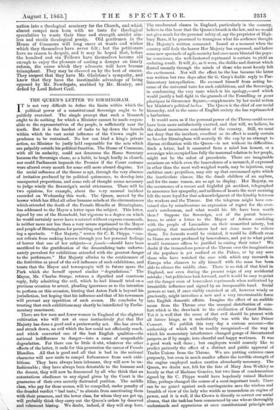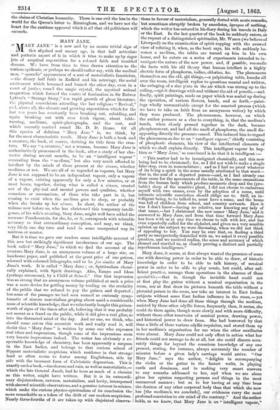THE QUEEN'S LETTER TO BIRMINGHAM.
JT is not very difficult to define the limits within which the
is power of a constitutional Sovereign ought to be publicly exercised. The simple precept that such a Monarch ought to do nothing for which a Minister cannot be made respon- sible to the representatives of the people, is sufficiently near the truth. But it is the hardest of tasks to lay down the bounds within which the vast social influence of the Crown ought in prudence to be restrained. No law can bind a king's private action, no Minister be justly held responsible for the acts which are palpably outside his political function. The House of Commons, with all its audacity, could not denounce the Home Secretary because the Sovereign chose, as a habit, to laugh loudly in church, nor could Parliament impeach the Premier if the Court costume were altered every month for some still more absurd disguise. Yet the social influence of the throne Is apt, through the very absence of irritation produced by its political quiescence, to develop into unexpected proportions; and some rule of thought seems necessary to judge wisely the Sovereign's social utterances. There will be two opinions, for example, about the very unusual incident recorded on Wednesday this week. The Queen, moved by the horror which has filled all other humane minds at the circumstances -which attended the death of the Female Blondin at Birmingham, has addressed to the Mayor a letter upon the subject. This letter, signed by one of the Household, but vigorous to a degree on which he would certainly never have ventured without express commands, is neither more nor less than a very severe reprimand to the Mayor and people of Birmingham for permitting and enjoying so demoraliz- ing a spectacle. "Her Majesty," writes Sir C. B. Phipps, "can- not refrain from making known through you her personal feelings of horror that one of her subjects—a female—should have been sacrificed to the gratification of the demoralizing taste unfortu- nately prevalent for exhibitions attended with the greatest danger to the performers." Her Majesty alludes to the continuance of the festivities as proof of the evil influence of such exhibitions, and trusts that the Mayor and townspeople will in future spare the Park which she herself opened similar "degradations." The Mayor, Mr. Charles Sturge, returns a dignified and courteous reply, fully admitting the evil, which he had himself tried on a previous occasion to arrest, pleading ignorance as to the intention to perform on this occasion, hinting that Aston Park is beyond his jurisdiction, but hoping that his influence and that of his townsmen will prevent any repetition of such scenes. He concludes by trusting that such exhibitions may shortly be interdicted by Parlia- mentary enactment.
There are few men and fewer women in England of the slightest cultivation who will not at once instinctively feel that Her Majesty has done a good and a praiseworthy act. She has struck, and struck down, an evil which the law could not efficiently reach, and which converted one of the best English qualities—the national indifference to danger—into a cause of unspeakable degradation. For there can be little dcubt, whatever the other effects of the letter, it ends for this generation the career of Female Blondins. All that is good and all that is bad in the national character will now unite to compel forbearance from such exhi- bitions. They have always been inhuman, they will now be un- fashionable; they have always been detestable to the humane and the decent, they will now be denounced by all who think that an ostentatious obedience to any signal given by the Court is the guarantee of their own secretly distrusted position. The middle class, who pay for these scenes, will be compelled, under penalty of the dreaded verdict "bad taste," to abstain from sanctioning them with their presence, and the lower class, for whom they are got up, will probably think they carry out the Queen's orders by deserved and vehement hissing. We doubt, indeed, if they will stop here.
The uneducated classes in England, particularly in the country, believe to this hour that the Queen's breath is the law, and we would not give much for the personal safety of, say the proprietor of High- bury Barn, if he presumed to transgress what his audience thought Her Majesty's written command. Issued at a moment when the country still feels the horror Her Majesty has expressed, and before some new spectacle of agile security had once more blunted the popu- lar Conscience, the well-bestowed reprimand is certain to yield an enduring result. It will fix, as it were, the dislike and distrust which floated uneasily through the minds of those who most keenly felt the excitement. Nor will the effect be the less because the letter was written but two days after Sir G. Grey's feeble reply to Par- liamentary interpellation. He excused himself from acting be- cause of the universal taste for such exhibitions, and the Sovereign, in condemning the very taste which is his apology,—and which would justify a bull-fight in the grounds of the Foundling or poses plasliques in Grosvenor Square,—supplements by her social action her Minister's political laches. The Queen is the chief of our social hierarchy, and in the name of English society she has reprimanded a barbarism.
It would seem as if the personal power of the Throne could never have been more satisfactorily exerted, and that will, we believe, be the almost unanimous conclusion of the country. Still, we must not deny that the incident, excellent as its effect is nearly certain to be—for Birmingham will scarcely fit the cap by an attempt to discuss civilization with the Queen—is not without its difficulties. Such a letter, had it emanated from a mind less honest, or a sovereign who occupied less fully the maternal relation to her people, might not be the safest of precedents. There are imaginable occasions on which even the benevolence of a monarch, if expressed in other than the most well-weighed words, may be injurious, may embitter caste prejudices, may stir up that envenomed spite which the inarticulate classes, like the dumb children of an asylum, and for the same reason, are so apt to display. Her Majesty, on the occurrence of a recent and frightful pit accident, telegraphed to announce her sympathy, and millions of hearts the next morning felt the more loyal for that acknowledgment of the kinship between the workers and the Throne. But the telegram might have con- tained also by misadventure an expression of regret for the over- seer's carelessness, and what would his life have been worth then ? Suppose the Sovereign, out of the purest benevo- lence, to order a letter to the Mayor of Ashton condoling with the people of Lancashire on their unmerited misery, but regretting that manufacturers had not done more to relieve them. No formula would be violated, it would be difficult even to blame an error produced by benevolence, and yet to what point would insurance offices be justified in raising their rates? We doubt if the tremendous power of the Throne over the imaginations of the populace is yet realized at the Palace, or by any save those who have watched the ease with which any monarch in Europe who chances to ally himself with the mass has been able to silence the middle class. There is no risk of that kind in England, nor even during the present reign of any accidental mistake ; but politicians look forward, and it would be easy to point out the danger even of benevolent reprimands when authorized by irresistible influence and signed by an irresponsible hand. Social powers so vast, if once visibly exercised at all, however wisely or graciously, might introduce a new and a very irrestrainable force into English domestic affairs. Imagine the effect of an audible moan from the Throne over the unequal distribution of com- fort which is the drawback to the civilization of Great Britain. Yet it is well that the sense of that evil should be present with all future kings, as it undoubtedly was with the late Prince Consort. We publish this very day a curious account—the authorship of which will be readily recognized—of the way in which his momentary interference changed gangs of discontented paupers, as if by magic, into cheerful and happy workmen. It was a good work well done ; but employers would scarcely like to predict patiently the effect of a distinct and public approval of Trades Unions from the Throne. We are putting extreme cases purposely, but even in much smaller affairs the terrible strength of the engine employed makes caution abundantly necessary. The Queen, we doubt not, felt for the fate of Mary Ann Walkley as keenly as that of Madame Geneive, but two lines of condemnation signed by Sir C. Phipps would have hopelessly ruined Madame Elise, perhaps changed the course of a most important trade. There can be no guard against such contingencies save the wisdom and breadth of view of the lady who wields so tremendous an engine of power, and it is well, if the Crown is directly to correct our social abuses, that the task has been commenced by one who so thoroughly understands and appreciates at once constitutional principle and the claims of Christian humanity. There is one evil the less in the world for the Queen's letter to Birmingham, and we have not the heart for the cautious approval which is all that old politicians will concede.































 Previous page
Previous page